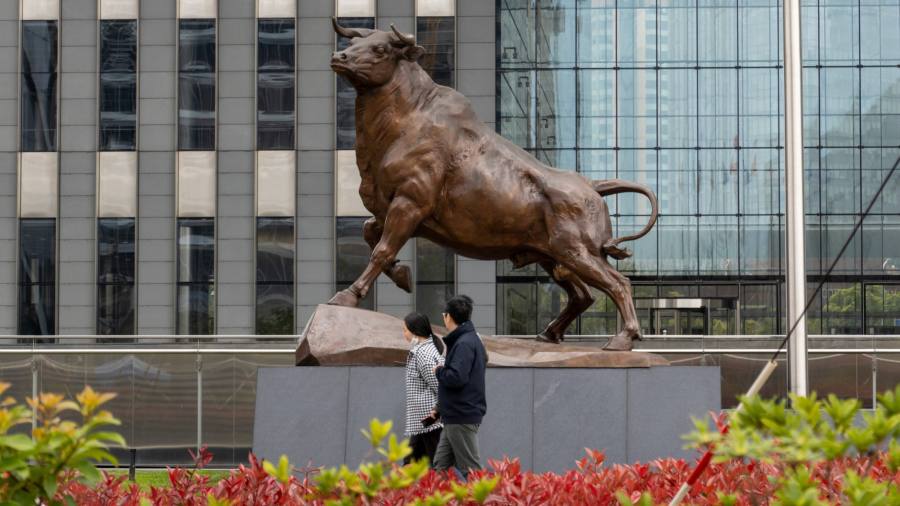US investor interest in Chinese stocks has cooled significantly after hitting a record late last year, as political tensions between the two countries grow.
News of China’s impending reopening from coronavirus pandemic restrictions late last year prompted a brief burst of enthusiasm for Chinese stock markets after years of underperformance on hopes of an uptick in economic growth. But trading activity has fallen back this year, according to fund managers and trading data.
Trading in the most liquid US-listed options that track Chinese stocks — which give a way for US investors to gain exposure to China without having an overseas presence — has more than halved since hitting a record last November. The drop in options trading comes as doubts grow about whether China can sustain its economic rebound following outsize growth in the first quarter, and as tensions between Beijing and Washington continue to worsen.
Direct purchases of Chinese stocks by foreign investors have also slowed dramatically after a record-breaking start to 2023. Foreign investors bought a net $20bn Shanghai- and Shenzhen-listed shares in the first month of 2023, but have added just $6bn in the three months since.
China started dismantling its Covid restrictions in December, paving the way for a reopening after three years of isolation under an anti-pandemic regime that weighed heavily on its economy. In the first quarter of this year, gross domestic product grew by 4.5 per cent year on year, well above the 3 per cent recorded for 2022.
“The easy money has been made,” said Abhay Deshpande, chief investment officer of New York-based Centerstone Investors. He said Centerstone bought shares in US-listed Chinese technology group Alibaba when the price tumbled during last year’s Communist party congress, but had kept a disproportionately small exposure to mainland China “to compensate for the macro risks”, for instance increased government oversight of companies or further sanctions.
Tensions between the US and China have been growing for several years, but the relationship has become particularly strained in recent months. In late January, a top US air force general predicted the US and China would probably go to war in 2025, and the following month Chinese spy balloons were discovered over the US.
China’s blue-chip CSI 300 index, which hit a three-and-a-half year low at the end of October when zero-Covid restrictions were posing increasingly severe challenges to the economy, rallied nearly 20 per cent to the end of January, but has since drifted lower.
Tyler Gellasch, president of investor trade group Healthy Markets Association, which focuses on market structure and regulation, said the group had been trying to make sure investors were preparing themselves for the risk of more aggressive US government action, such as restrictions on US citizens investing in China.
“Public opinion and the language coming from politicians and executive branch agencies is stark . . . that’s language that should concern anybody with significant investments that could be subject to restrictions,” he said.
Christel Rendu de Lint, head of investments at fund firm Vontobel, said many investors had been responding to the escalating tensions by seeking funds that would invest in emerging markets but exclude China.
She said many had become extra cautious after seeing the losses suffered by investors who were stuck holding Russian assets that were subject to western sanctions following the invasion of Ukraine. In many cases, foreign investors have written such assets down to zero.
“The risk of sanctions together with the risk of regulation by the Chinese government, all pushed in the same direction to investors wanting exposure [to emerging markets] ex China,” she said.
China has, meanwhile, continued to expand a series of programmes that connect its own closed-off financial system to international markets. On Friday, the People’s Bank of China unveiled rules for a swap connect programme, which will allow international investors to buy mainland interest rate swaps through Hong Kong and which is expected to begin trading soon.
The move follows on from schemes that allow investment to flow in both directions between mainland stock and bond markets and Hong Kong, as well as a Wealth Connect programme that allows mainland savers to access investment products in the financial territory.
Additional reporting by Thomas Hale in Shanghai
Read the full article here




